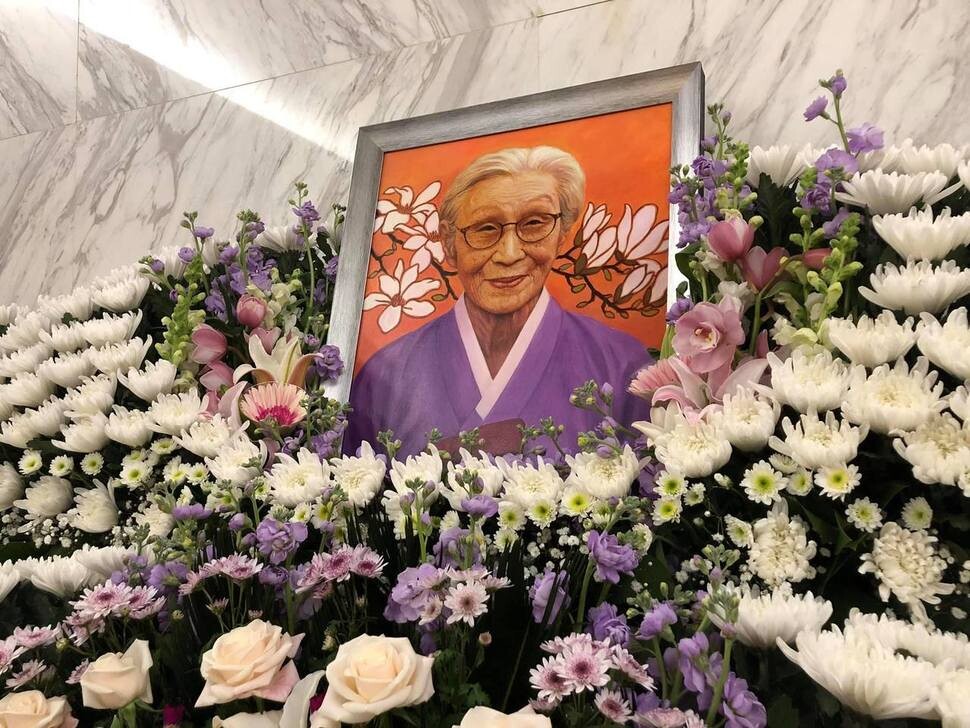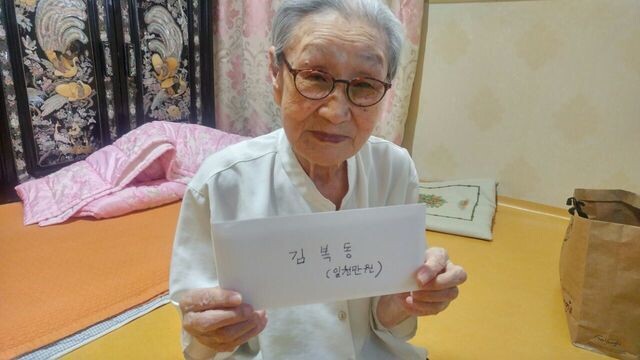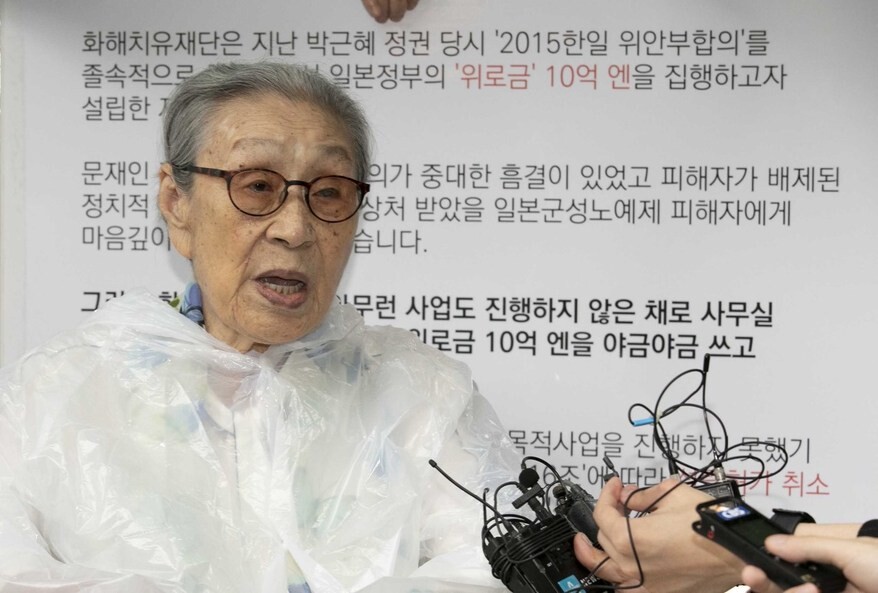hankyoreh
Links to other country sites 다른 나라 사이트 링크
Former comfort woman Kim Bok-dong passes away at 93

Kim Bok-dong, a former comfort woman for the Japanese imperial army, has passed away. She was 93 years old.
Kim’s battle with cancer came to an end at 10:41 pm on Jan. 28 at Severance Hospital in Sinchon, in Seoul’s Seodaemun District.
Born in Yangsan, South Gyeongsang Province, Kim was forced to serve as a comfort woman, or sex slave, for the Japanese imperial army at the age of 14. She returned to Korea at the age of 22. Kim was an activist for peace who testified about the suffering of the comfort women both in Korea and in other countries.
In 2015, Kim donated 50 million won (US$44,762) which represented her live savings, to the Butterfly Fund for use in supporting young victims in conflict zones and for training peace activists. The Butterfly Fund used this money to create the Kim Bok-dong scholarship fund.
That same year, Kim’s name appeared on a list of “heroes who fight for freedom” selected by international press organizations, alongside Nelson Mandela, the first black president of South Africa, and Martin Luther King Jr., a leader of the US civil rights movement.
Last year, Kim became the first recipient of the “righteous figure award,” which is chosen by a foundation called Jung (chaired by Kim Jae-hong and Kim Yong-gyun). Jung explained its selection of Kim Bok-dong as follows: “Despite bearing the pain of being a former comfort woman, Kim Bok-dong donated nearly all her assets to educating the next generation and has worked to spread her convictions about peace and unification and a proper understanding of South Korea and Japan’s historical issues.”

Kim’s interest in educating young Zainichi Koreans
Kim had an unusual amount of affection for ethnically Korean children living in Japan, also known as Zainichi Koreans. Since Kim was taken away at a young age to serve as a comfort woman, she never managed to get a decent education. That may explain why she took a particular interest in students at Japan’s Chosen Gakko (schools affiliated with North Korea), which receive little funding from the Japanese government.
Kim had been funding scholarships for six students at Chosen Gakko since 2016. While lying in a bed at Severance Hospital on Nov. 22, 2018, Kim donated an additional 30 million won (US$26,870) for use as scholarships for students at Chosen Gakko.
Kim’s unrealized hopes for a sincere apology from Abe administration
What Kim was hoping until the very end was “getting a sincere apology from Abe,” referring to Japanese Prime Minister Shinzo Abe.
Along with Kim, another former comfort woman died on Monday, a 93-year-old woman surnamed Lee.
“At the end of last year, [Lee’s] health started to go downhill. Recently, it got even worse, and she was in a lot of pain until she passed away this morning. I hope that she is at peace, having forgotten all the pain, loneliness and hard times,” said Yoon Mi-hyang, president of the Korean Council for Justice and Remembrance, in a post on Facebook on Monday.
“In 1942, at the age of 17, [Lee] and two coworkers were on their way home from the textile mill where they worked when they were kidnapped by soldiers who got off a military truck. After that, Lee was taken first to Japan and then to Manchuria where she suffered horrific abuse.”

Death of another comfort woman victim leaves only 23 remaining survivors
After Korea’s liberation from Japanese colonial rule, Lee barely managed to return home by getting a ride on a smuggling ship. “She was tormented her entire life by the sense of guilt and a victim mentality resulting from her terrible experiences. Whenever I visited her, I felt bad about the pain and loneliness that were evident on her face,” Yoon wrote in her post.
On Monday, Minister of Gender Equality and Family Jin Sun-mee conveyed her condolences on Lee’s passing.
“Since Lee wasn’t in good health when I saw her not long ago, I’d been sincerely hoping that her condition would quickly improve. It’s such a shame that we have to say goodbye to her so soon. I will do my best to frequently visit each of the former comfort women before it’s too late and to ensure that they are comfortable and in good health,” Jin said.
The Korean Council for Justice and Remembrance announced that Lee’s funeral would be held in private, out of the respect for the wishes of Lee and her surviving family.
The deaths of the two women bring the number of surviving comfort women down to 23.
By Lee Yu-jin and Park Da-hae, staff reporters
Please direct comments or questions to [english@hani.co.kr]

Editorial・opinion
![[Column] Park Geun-hye déjà vu in Yoon Suk-yeol [Column] Park Geun-hye déjà vu in Yoon Suk-yeol](https://flexible.img.hani.co.kr/flexible/normal/500/300/imgdb/original/2024/0424/651713945113788.jpg) [Column] Park Geun-hye déjà vu in Yoon Suk-yeol
[Column] Park Geun-hye déjà vu in Yoon Suk-yeol![[Editorial] New weight of N. Korea’s nuclear threats makes dialogue all the more urgent [Editorial] New weight of N. Korea’s nuclear threats makes dialogue all the more urgent](https://flexible.img.hani.co.kr/flexible/normal/500/300/imgdb/original/2024/0424/7317139454662664.jpg) [Editorial] New weight of N. Korea’s nuclear threats makes dialogue all the more urgent
[Editorial] New weight of N. Korea’s nuclear threats makes dialogue all the more urgent- [Guest essay] The real reason Korea’s new right wants to dub Rhee a founding father
- [Column] ‘Choson’: Is it time we start referring to N. Korea in its own terms?
- [Editorial] Japan’s rewriting of history with Korea has gone too far
- [Column] The president’s questionable capacity for dialogue
- [Column] Are chaebol firms just pizza pies for families to divvy up as they please?
- [Column] Has Korea, too, crossed the Rubicon on China?
- [Correspondent’s column] In Japan’s alliance with US, echoes of its past alliances with UK
- [Editorial] Does Yoon think the Korean public is wrong?
Most viewed articles
- 1‘We must say no’: Seoul defense chief on Korean, USFK involvement in hypothetical Taiwan crisis
- 2[Reportage] On US campuses, student risk arrest as they call for divestment from Israel
- 3[Column] Park Geun-hye déjà vu in Yoon Suk-yeol
- 4‘Weddingflation’ breaks the bank for Korean couples-to-be
- 5Korea sees more deaths than births for 52nd consecutive month in February
- 6N. Korean delegation’s trip to Iran shows how Pyongyang is leveraging ties with Moscow
- 7Amnesty notes ‘erosion’ of freedom of expression in Korea in annual human rights report
- 8Will NewJeans end up collateral damage in internal feud at K-pop juggernaut Hybe?
- 9N. Korean hackers breached 10 defense contractors in South for months, police say
- 10[Guest essay] The real reason Korea’s new right wants to dub Rhee a founding father